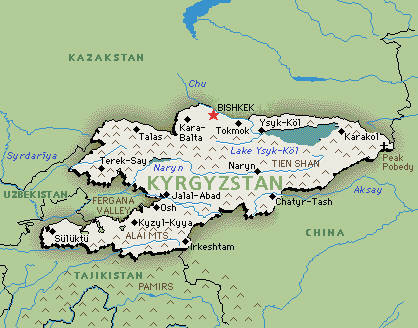Pak-trained militants spreading Islamic radicalism in Central Asia
 Kosh-Korgon (Kyrgyzstan), Aug. 18 : Some Central Asians are reported to have acquired training from the Taliban in Pakistan and Afghanistan and are now spreading Islamic radicalism in the region.
Kosh-Korgon (Kyrgyzstan), Aug. 18 : Some Central Asians are reported to have acquired training from the Taliban in Pakistan and Afghanistan and are now spreading Islamic radicalism in the region.
Kyrgyz security services recently tracked down three locals soon after their arrival. They stormed a building along the Kyrgyz-Uzbek border where they were staying, killed two of them, while a third blew himself up.
The security operation was one in a recent spate of firefights and attacks in Central Asia that have raised concerns that homegrown militants with experience in Afghanistan and Pakistan may be trying to move north to take on the region's brittle governments, reports the New York Times.
Senior officials and analysts across Central Asia have said in recent weeks that there is evidence that some Central Asians who were allied with the Taliban are retreating from Afghanistan because of pressure from the NATO mission there.
"Our belief is that because of the blow they suffered in Afghanistan, they left for a calmer place in Central Asia where they could resume operations - either to regroup or to even open up a new front," said Kadyr K. Malikov, director of the Independent Analytical Research Center for Religion, Law and Politics in Bishkek, the Kyrgyz capital.
The officials and analysts said one result could be a strengthening of Islamic movements in Central Asia, especially here in the Fergana Valley, which includes parts of Kyrgyzstan, Uzbekistan and Tajikistan. All three countries are former Soviet republics with secular leaders and Muslim populations.
The valley has long been considered one of the region's most unstable areas because of poverty, militancy and loose borders.
Warnings about the spread of Islamic radicalism to Central Asia are not new, and the region's governments have long used this supposed threat to justify severe restrictions on political freedom.
But if these recent signs point to a revival, it could pose difficulties for the United States and other NATO members, which have military bases throughout Central Asia that support operations in Afghanistan.
Whatever the deeply held views of people here, some experts and opposition politicians in Central Asia said the danger of a renewed Islamic insurgency was being overstated.
They pointed out that these countries are secular in character because of their decades in the Soviet Union and that it would be all but impossible for the Taliban to gain a foothold here because they are rooted in an ethnic group, the Pashtuns. (ANI)